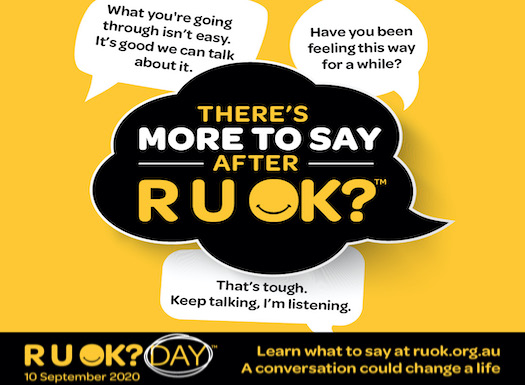Kim Borrowdale is a communications specialist who lends her expertise to socially conscious organisations, many of these in the mental health and suicide prevention sector.
As a Director of Community Broadcasting Foundation Kim is particularly passionate about supporting community media to survive and thrive.
She shares some resources from R U OK? in this article for radioinfo.
For nearly a year, thanks to fires, floods and now COVID-19, it’s fair to say that a lot of people are not OK. Whether they’ve been directly or indirectly affected by these disasters, the knock on effect it is having on us in every area of our lives – physically, financially, socially and emotionally – is undeniable.
In the media sector these impacts are being acutely felt, firstly through the vicarious trauma that comes with supporting communities through news and reporting and secondly, through the wide sweeping job cuts and uncertainty in the commercial and community media landscape.
As has been an occupational hazard for generations, many are both reporting on and trying to hang on personally to this rollercoaster ride of life.
So, what can we do to support each other when sometimes it feels like everyone around you is experiencing some sort of issue? And how can we do this while managing our own physical and mental health?
Next week, Thursday 10 September 2020, is R U OK?Day, a national day of action.
Cupcakes are great but now, more than ever in R U OK?’s ten year existence, we need more than a morning tea.
Now is the time to acknowledge that there’s more to say after R U OK? and be ready for what comes next. The likelihood of needing to have tough conversations after you ask that all important question is at an all-time high.
With news of redundancies and ongoing job uncertainty in the media sector and many others, you will almost certainly need to support a colleague or friend going through this, if you’re not already. The news you read online suddenly becomes very personal when someone you know, love and respect is talking with you on the phone or standing in front of you telling you they have lost their job. For people whose profession is often about finding the most powerful words to pair with a situation, it is these times where you can be lost for words.
That’s where R U OK? can help you.
The team at R U OK? has put together some resources to unpack their four step conversation model of ask, listen, encourage action and check in. They have compiled simple phrases and open ended questions to help you navigate a difficult conversation with someone who might be struggling right now.
Included below are some examples but you can find a more exhaustive list on their website at ruok.org.au as well as some free resources, posters and social media tiles to download and share in your workplace, at home and online.
Getting involved in R U OK?Day may be as simple as letting people around you know that you’re there for them if they need a friendly ear. You don’t have to have the answer to their problems. You just need to stand alongside them and be there.
Helping someone navigate life’s ups and downs at the moment may take a little more homework on to make sure you are ready for whatever they’ve got to say. We can and will get through this – together.
R U OK? – Your guide to what to say next
There’s more to say after R U OK?
- Ask R U OK?
There are many ways to start a conversation that could change a life. You could say:
- “I know there’s been some big life changes for you recently, how are you going with that?
- “Just checking in, to see how you’re going?
- “With everything that’s going on, you’ve been on my mind lately, how are you?”
- “You’ve got a lot going on right now. How are you doing?”
- Listen
Help them open up and share what’s going on for them. You could say:
- “I’m not going to pretend I know what it’s like for you, but I’m here to listen to why you feel the way you do.”
- “What you’re going through isn’t easy, I’m glad we can talk about it.
- “Thank you for sharing this with me. That can’t have been easy for you.”
- “Take your time, I’m here for you.”
- Encourage action
Once they’ve opened up, encourage them to access support or to do something that might make the load a bit lighter. You could say:
- “What do you think is a first step that would help you through this?”
- “What can I do right now to support you?”
- “What’s something you enjoy doing? Making time for that can really help.”
- “Do you think it would help for you to talk to someone else about some of these things, maybe a health professional?”
- Check in
Remember to check in a few days later to see how the person is doing. You could say:
- “Just wanted to check in and see how you’re doing?”
- “Have things improved or changed since we last spoke?”
- “Is the support we discussed working for you?”
- “Do you need more support?”
Visit ruok.org.au to find out more.
Related articles:
I’m out, Now what? New from Game Changers Radio
Farewell ABC, my main squeeze: Andrea Ho takes redundancy
SCA’s Dave Cameron answers our questions about the axeing of local breakfast shows
Michael Cavanagh: beginning the next chapter after ABC redundancy
About the Author
 Kim is a change communication specialist and storyteller who is passionate about using her professional and personal skills to make a positive contribution to communities.
Kim is a change communication specialist and storyteller who is passionate about using her professional and personal skills to make a positive contribution to communities.
In her more than twenty years’ experience working across the public, private and not for profit sectors, she has built a portfolio delivering change management projects and communication strategies in Australia and around the world. Some of these projects include work on international aid transparency initiatives, introducing change management networks for developing country programs and establishing collaborative communication frameworks for eHealth NSW and the Australian suicide prevention sector.
Previously Acting CEO for Suicide Prevention Australia, Kim now lends her expertise to socially conscious organisations and is a proud Director of Australia’s Community Broadcasting Foundation.
LinkedIn: www.linkedin.com/in/kimborrowdale/
Subscribe to the radioinfo flash briefing podcast on these platforms: Acast, Apple iTunes Podcasts, Podtail, Spotify, Google Podcasts, TuneIn, or wherever you get your podcasts.



